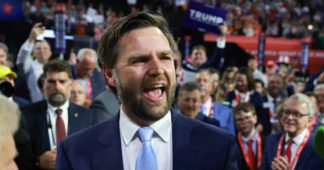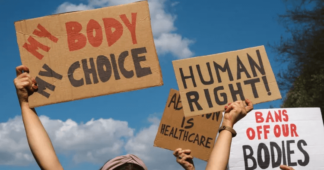Facism is the logical and ultimate political form of neo-liberalism
Richard Murphy is an economic justice campaigner. Professor of Accounting, Sheffield University Management School. Chartered accountant. Co-founder of the Green New Deal as well as blogging at Funding the Future
Cross-posted from Richard Murphy’s blog ‘Funding the Future’
Jul 17 2024
This has been a disturbing day in world politics.
Donald Trump has selected a new running mate, J. D. Vance, a senator from Ohio. Vance was previously a harsh critic of Trump, suggesting that he could be the United States Hitler, but since doing so, he has dramatically changed his tune. He has fallen under the influence of Peter Thiel, who is a former director of PayPal and one of its founders and, as a consequence, a multi-billionaire.
Thiel is one of the funders of the ultra-right in America, who take libertarianism way beyond previously known limits. They question the right of the state to exist. It is their aim at all times to undermine its administration. Their belief is that freedom and democracy might well be incompatible. Their goal is to restore the rights of the individual, but they see the individual in question as being a white male.
Their attitudes towards abortion threaten the well-being of American women.
Their attitudes on race are atrocious.
The fear is that they have populist support amongst large parts of the population, and the reason for that is that neoliberalism has failed.
As a matter of fact, neoliberalism has not delivered rewards to most Americans, just as it has not delivered rewards to most people in the UK or in Europe. The benefit of the last 40-plus years of neoliberal rule of all of those places, in the wake of the revolution by Milton Friedman and Hayek – put forward by Margaret Thatcher and Ronald Reagan as the answer to the post-war years of Keynesian consensus – has been that we have seen a massive redistribution of wealth upwards in society.
Those on middle and lower incomes have seen, overall, relatively little increase in their well-being. And that is most especially true for those on the lowest levels of income. They are particularly prejudiced by what has happened, and as a consequence they feel, not unreasonably, alienated from the entire political process. That is most especially the case when, as is the case in the UK, the USA, and in many other countries, including Ireland, Germany, and France, the main ruling parties are acting in coalition to preserve the hegemony of the neoliberal way and to block any alternative that might be available, particularly from those on the left who seek the redistribution of income and wealth for the benefit of everyone in society.
The consequence has been the rise of fascism. Donald Trump has exploited this. In the UK we are seeing Nigel Farage do it with Reform. In France we’re seeing Marie Le Pen do it. And, of course, the AfD have risen in Germany. In Ireland the reaction is slightly different. The move has been towards Sinn Féin on the left and not towards the right, although there are very nasty right-wing politicians in Ireland who are creating dissent, particularly in areas of deprivation.
What are we seeing? We’re seeing a challenge to the democratic way of life with which most of us are familiar and which we have grown up with and which we have always presumed will continue. The possibility is that it won’t. There is a real chance that democracy is now at peril.
Now we have flawed democracy, I don’t pretend otherwise. In the UK, we have first-past-the-post elections, which do not deliver a parliament that reflects the will of the people in this country. That is abundantly clear. But what we also know is that there is an element of choice in this, although our political parties have conspired to shut it down, in particular in the UK at least, eliminating the left from consideration as a consequence.
With the demise of Labour as a left-wing party under Keir Starmer, there is now no strong left-of-centre electoral force with the prospect of immediate government in the UK. As a result, people feel that they cannot be represented by existing parties. And unsurprisingly, we see Reform rising in the UK.
And we see Trump’s Republicans rising in the USA, and so on.
Is there a way around this? Well, yes, there very obviously is. The answer is actually quite straightforward. If this alienation of vast numbers of people is caused by the fact that the rewards of neoliberal economic growth have not been fairly distributed, the answer is to fairly distribute the income and wealth that now exists.
Income and wealth are massively imbalanced as to their distribution in all the economies I have mentioned, so those who have been left out have begun to feel that they have no chance of sharing in the prosperity which we as countries have generated. Because let’s not dispute this, we are richer than we have ever been, despite all the challenges that we face.
And so, the answer now is very straightforward. We have a choice. We can redistribute income and wealth, or we can pave the way to fascism. And those politicians who deny that redistribution of income and wealth is not possible because, they say, this would not be politically acceptable to those who own it are in the wrong. Making excuses for the pathway to fascism, they are, in my opinion, fascist enablers.
This is a deeply dangerous situation. I am extremely worried about it. I won’t pretend otherwise. I sometimes sit in the depths of despair thinking about the prospect of what is to come, the threat that it poses, and the risks inherent within it.
The challenge is to those who want to stand up for the truth and who draw attention to the potential bloodbath hat is planned, because let’s be clear, that is what Trump has promised in the USA if he doesn’t win. All of this, of course, leaves me worried. Why wouldn’t it? Why should anyone not be worried in the face of such risk?
But why is it, in that case, that these politicians, who have gained power as neoliberals are so adamant that they must continue on the same paths that they have pursued for some time, fuelling the rise of populism as a result? I wish I knew the answer to that because I genuinely don’t know what it is. I presume them to be people of goodwill, people who wish for the best and who hope that they might make the world a better place. But their actions are denying that possibility. Why are they so conflicted?
What is it about their belief system and the inculcation of neoliberalism within their ethos that so distorts their thinking that they cannot see that without fundamental change in the society that we have the alternative is not something a little different from where we are with a few tweaks here and there on the way, which is what these neoliberals propose.
I hope that somehow we can get that message about how they are paving the path to fascism through to them.
I reiterate that the choice is a simple one. We redistribute income and wealth, or we pave the path to fascism. That is it.
I know which way I am inclined to go. I want to redistribute income and wealth.
Isn’t it time that our politicians did the same, because the threat from fascism is so much greater than the threat that they face from upsetting a few wealthy people who might have to pay a bit more tax to preserve the wellbeing of the society in which we live and which actually keeps the wealth of those people intact?
We remind our readers that publication of articles on our site does not mean that we agree with what is written. Our policy is to publish anything which we consider of interest, so as to assist our readers in forming their opinions. Sometimes we even publish articles with which we totally disagree, since we believe it is important for our readers to be informed on as wide a spectrum of views as possible.











